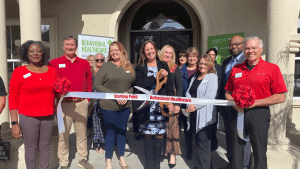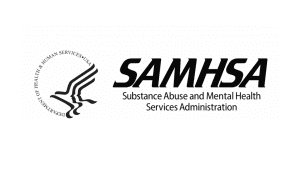What is Domestic Violence and How to Get Help in Nassau County, Florida
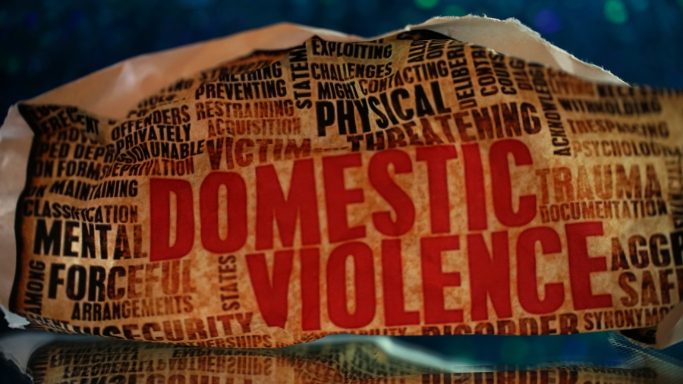
If you or someone you care about is a domestic violence survivor, then you need to know that there are resources to help right here in Nassau County, Florida. In this post, we’ll take a close look at domestic violence to try to better understand its dynamics, and then share some detailed information on programs and services that are at your disposal.
Before we begin, let’s look at this definition of domestic violence provided by the National Domestic Violence Hotline.
“Domestic violence (also referred to as intimate partner violence (IPV), dating abuse, or relationship abuse) is a pattern of behaviors used by one partner to maintain power and control over another partner in an intimate relationship.
“Understanding Relationship Abuse.” The Hotline, 20 Sept. 2021, https://www.thehotline.org/identify-abuse/understand-relationship-abuse/.
Domestic violence doesn’t discriminate. People of any race, age, gender, sexuality, religion, education level, or economic status can be a victim — or perpetrator — of domestic violence. That includes behaviors that physically harm, intimidate, manipulate or control a partner, or otherwise force them to behave in ways they don’t want to, including through physical violence, threats, emotional abuse, or financial control.
Multiple forms of abuse are usually present at the same time in abusive situations, and it’s essential to understand how these behaviors interact so you know what to look for.”
The Warning Signs of Abuse
To recap, domestic violence involves a person maintaining power and control over another in a relationship, it can happen to anyone, and, most often, there are multiple forms of abuse happening simultaneously. Now let’s look at some of the warning signs of abuse. It’s important to remember that possessive and controlling behaviors don’t always appear immediately. At the start of a new relationship, your partner may seem completely normal, supportive even. But the following signs may develop over time and you should look out for them.
- Telling you that you never do anything right.
- Showing extreme jealousy of your friends or time spent away from them.
- Preventing or discouraging you from spending time with your friends, family members, or peers.
- Insulting, demeaning, or shaming you, especially in front of other people.
- Preventing you from making your own decisions, including about working or attending school.
- Controlling finances in the household without discussion, including taking your money or refusing to provide money for necessary expenses.
- Pressuring you to have sex or perform sexual acts you’re not comfortable with.
- Pressuring you to use drugs or alcohol.
- Intimidating you through threatening looks or actions.
- Insulting your parenting or threatening to harm or take away your children or pets.
- Intimidating you with weapons like guns, knives, baths, or mace.
- Destroying your belongings in your home.
Source: “Warning Signs of Abuse.” The Hotline, 15 June 2021, https://www.thehotline.org/identify-abuse/domestic-abuse-warning-signs/.
Why do People Stay?
No one deserves to experience any form of abuse or violence. Sometimes, it can be hard to understand why a friend, family member, or a loved one would stay in a situation that is causing them harm. There are many reasons that we may not understand but the biggest piece of advice is that you should always lend a listening ear and reserve judgment. You may be the only one that hears them out. Among many, let’s explore two reasons why someone may stay – the economic reasons and the trauma bond.
Economic Reasons
When thinking about leaving an abusive partner, many things are going on in the survivor’s mind. One of those thoughts is certainly the financial costs associated with leaving. If this person has children, the fear of leaving and being able to ‘make it’ on their own certainly increases. Consider these economic barriers to help you understand why leaving may be more difficult than it seems:
- Prevented from working: Perhaps the survivor has been prevented from working and has no job to support themselves and their kids (if there are any).
- Skills atrophy: If someone has been without work for a long period of time, their marketable skills may need refinement before being able to re-enter the workforce.
- Fears of reentering the workforce: It can be overwhelming to think about reentering the workforce. Perhaps the thought of staying, and sustaining the abuse, is less scary to the survivor than the unknown.
- Affordable Housing: There may be a shortage of affordable housing. Oftentimes, affordable housing options force recipients to look outside of the areas where their support systems live.
Trauma Bonds
If the economic barriers to leaving weren’t enough, let’s combine that with ‘trauma bonds’ to better understand why a survivor might stay.
“A trauma bond is a connection between an abusive person and the individual they abuse. It typically occurs when the abused person begins to develop sympathy or affection for the abuser. This bond can develop over days, weeks, or months.”
“Trauma Bonding: Definition, Examples, Signs, and Recovery.” Medical News Tooday, MediLexicon International, https://www.medicalnewstoday.com/articles/trauma-bonding#Why-does-it-happen.
Trauma bonding makes it even harder to leave an abusive situation. Basically, the abusive person and the person they abuse develop a bond (the abuse) that is unique to their relationship. And once the trauma bond is created, it can be very difficult to break, especially when there is intermittent positive attention weaved into the abuse.
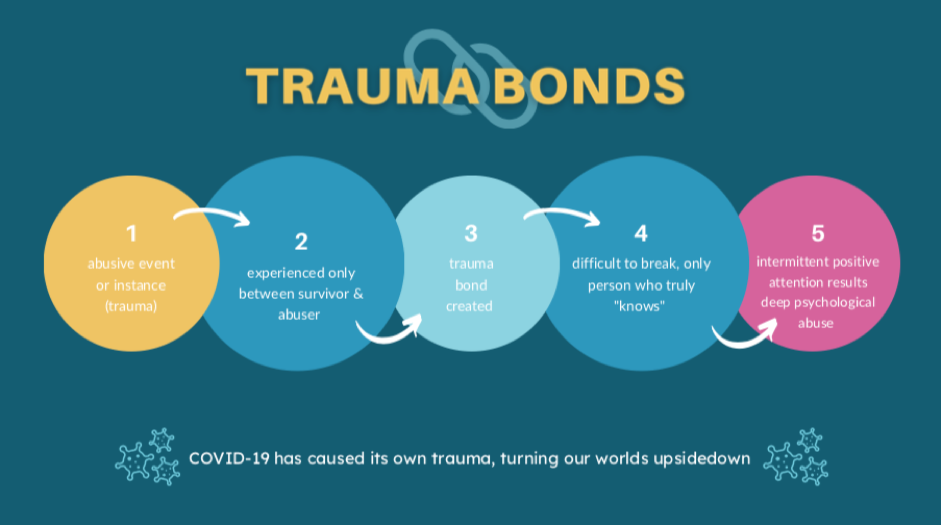
Why is the case? Our brains tend to glaze over the bad in order to survive. And, if the abusive partner wasn’t always abusive, it’s easy to remember the times that they were supportive, caring, and kind. When a survivor remembers those times, they may think that the abuser will revert back and change their ways. The apologies and the “good times” cause survivors to doubt their feelings. This creates a very complex connection to the abuser. The psychological effect on the survivor can be a conditioned feeling of worthlessness and hopelessness. Unfortunately, the survivor may not believe that they are worthy of healthy love.
That’s where friends, families, and support systems come in. There are plenty of ways to advocate and assist someone that is a survivor of domestic violence. As we mentioned earlier, the best way you can offer support is to listen, ask questions, and to stay connected and provide resources to the survivor.
Micah’s Place Domestic Violence Center
Micah’s Place is Nassau County, Florida’s only domestic violence center. They were founded in 2003 and have been serving the community since. They operate a 24-hour hotline and emergency shelter; non-residential programs, such as support groups, economic empowerment and financial assistance, as well as legal aid; Child Protective Investigative Team Support; community and corporate training; and the Global Citizens anti-bullying and healthy relationship school curriculum. Survivors who are at any point in their healing journey may receive services from Micah’s Place.
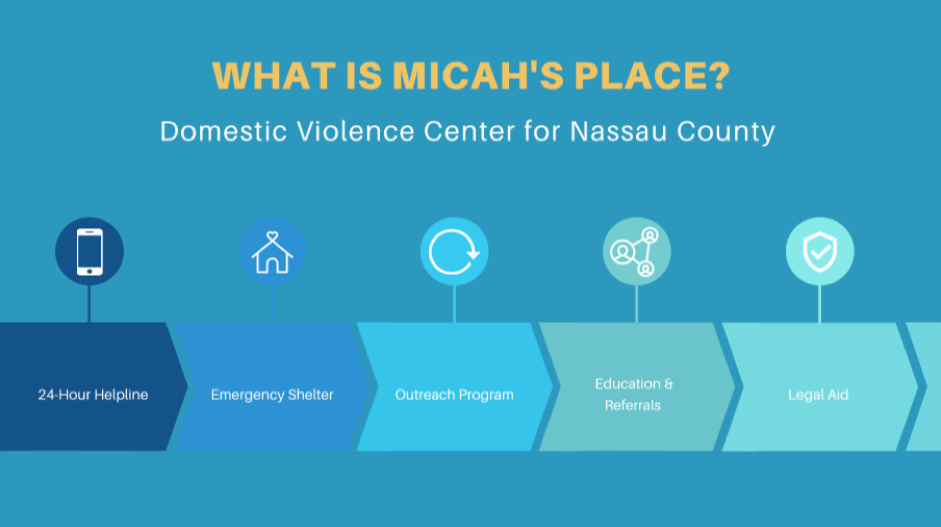
If you are someone that is considering leaving an abusive relationship or trying to help someone find shelter, you may be interested in the dynamics at Micah’s Place. Micah’s Place is always:
- Confidential & Free: Micah’s Place offers free services with advocates who hold privilege to keep interactions confidential.
- Empowerment Based: After escaping control, Micah’s Place puts the power back into the hands of the survivor.
- Survivor First: Micah’s place knows that the survivor is the expert in their situation. All of their services are geared toward survivor-defined goals.
Services Provided at Micah’s Place
| Micah’s Place 24-Hour Hotline | Call or text: 904-225-9979 (TTY 904-225-9979) *For survivors or a concerned loved one |
| Domestic Violence Shelter | Micah’s Place provides refuge and crisis intervention when home is not a safe place. Shelter participants receive emergency clothing, food, personal care items, support groups, economic empowerment programs, justice advocacy, and other services. |
| Support Groups & Individual Counseling | Micah’s Place offers individual and group counseling to victims of domestic violence. Weekly support groups address issues regarding domestic violence and its impact on the family. |
| Justice Advocacy | Micah’s Place advocates offer assistance and support to survivors as they apply for injunctions for protection at Clerk of Court offices, provide support to survivors in criminal court proceedings, and refer victims to legal services as needed. |
| Child Protection Advocacy | Micah’s Place provides services including information and referrals, relocation assistance, justice advocacy and crisis intervention to families identified through the Nassau County Child Protection Investigation Department. |
| Purple Dove Resale Centers | Micah’s Place program participants receive gift cards to purchase items at the Purple Dove Resale Centers including clothing and items needed to reestablish a household. |
| Primary Prevention | Micah’s Place is committed to providing youth with the tools and resources they need to help end domestic violence. Through their prevention efforts, they are always looking for ways to reach out to youth and encourage specifically team involvement, particularly those who are residing in their emergency shelter. |
Posted In:
Like this post? Don't forget to share it!
MORE RECENT POSTS


